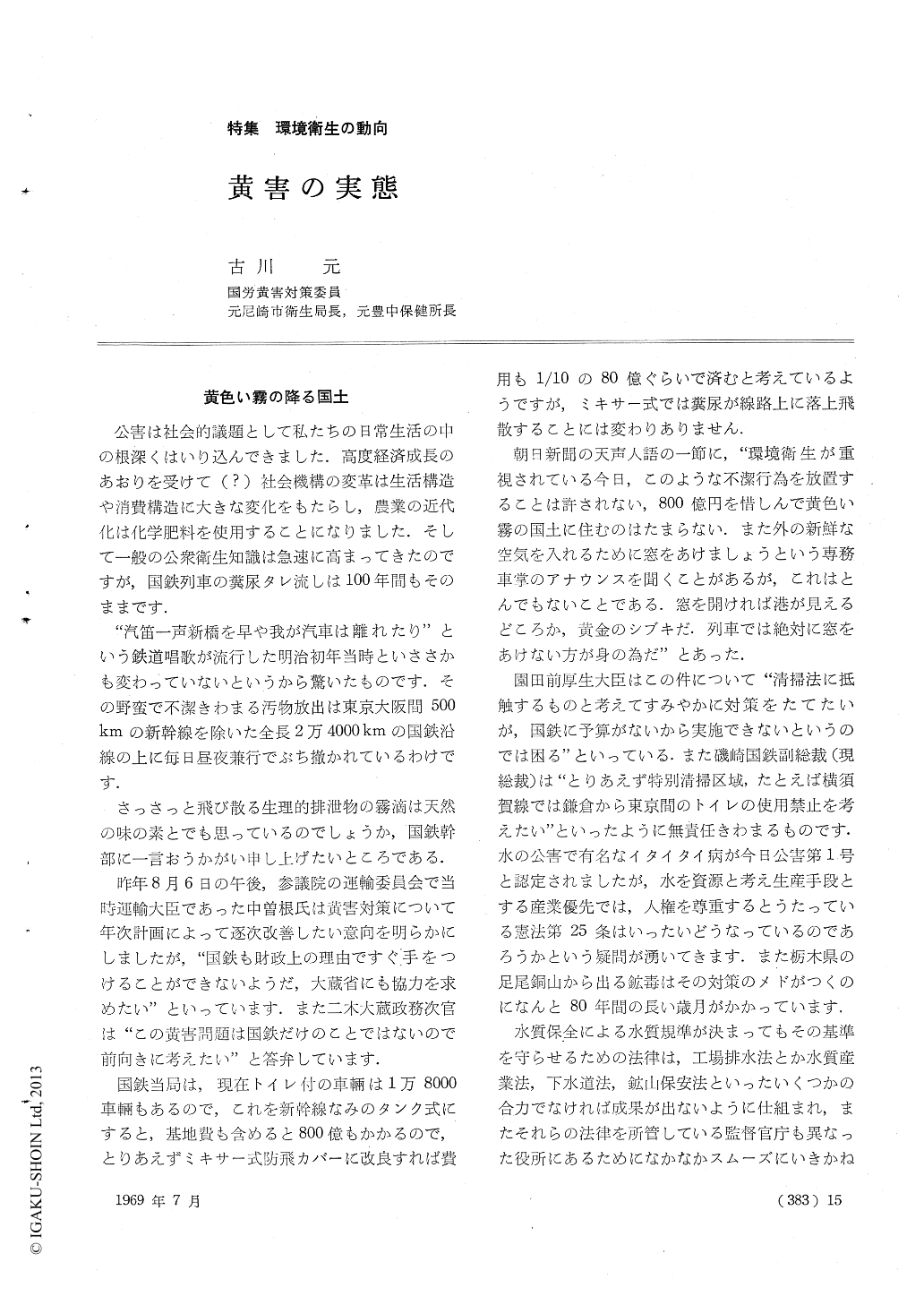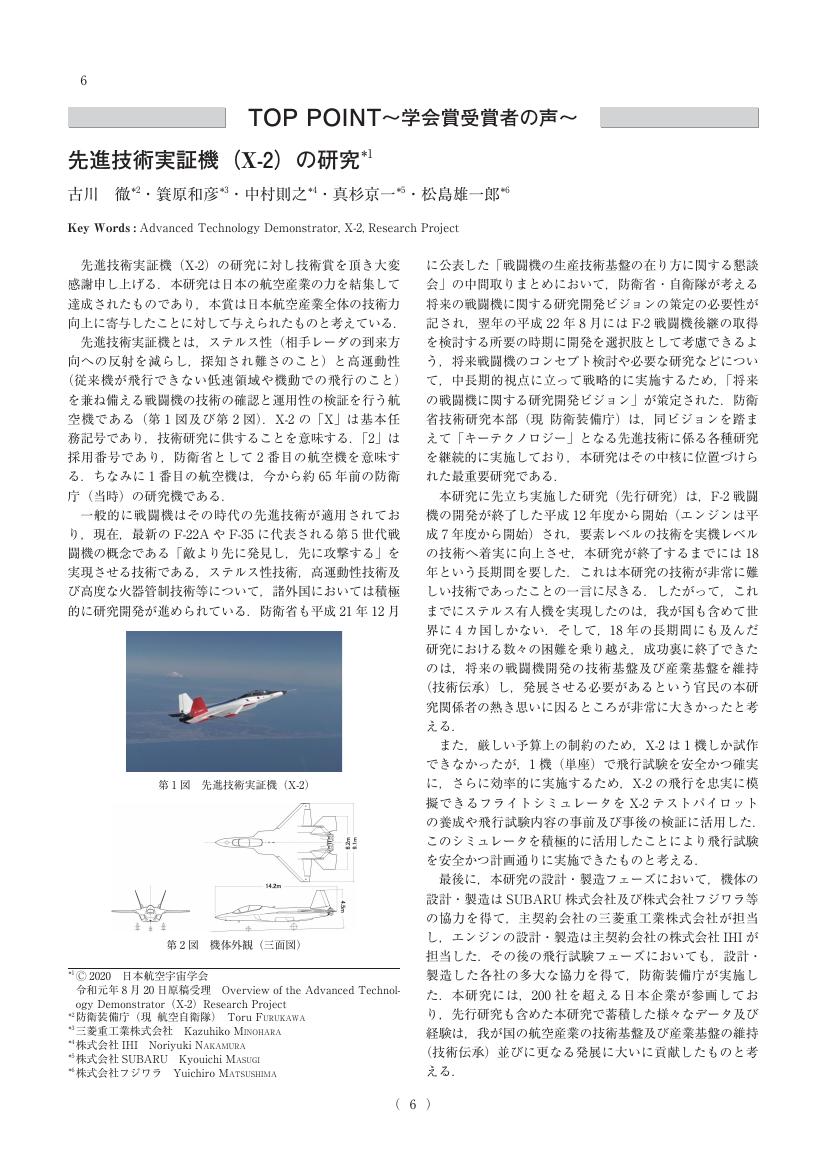1 0 0 0 日中戦争期の前田米蔵 : 前田の憲政論を中心に
- 著者
- 古川 隆久
- 出版者
- 史学会 ; 1889-
- 雑誌
- 史学雑誌 (ISSN:00182478)
- 巻号頁・発行日
- vol.128, no.6, pp.971-1005, 2019-06
1 0 0 0 DEAを用いたがけ崩れにおける警戒避難基準雨量の設定
- 著者
- 佐藤 丈晴 荒川 雅生 中山 弘隆 鉄賀 博己 古川 浩平
- 出版者
- 公益社団法人 土木学会
- 雑誌
- 土木学会論文集 (ISSN:02897806)
- 巻号頁・発行日
- vol.2002, no.707, pp.153-163, 2002
降雨によるがけ崩れ発生予測としてがけ崩れ発生限界雨量線 (CL) の設定手法が提案されている. しかしながら, 従来のがけ崩れ発生限界雨量線はほとんどが線形で示されており複雑な自然現象を再現しているとは言い難い. またその的中精度が低い問題がある. そこで本研究では, 従来のがけ崩れ発生限界雨量線の問題を解決するために, 包絡分析法 (DEA) を応用して警戒避難基準雨量の設定を試みた. 本手法では降雨データの分布のみから, 最適な警戒避難基準雨量の設定ができる. そして, がけ崩れの予測に関する検討を行い従来のがけ崩れ発生限界雨量線と比較して精度の向上を確認した. さらに警戒基準雨量, 避難基準雨量の設定を試み, 従来手法との比較を行いその有用性を検証した.
1 0 0 0 OA 社会表象研究の地平 : 「生きられた文化」への眼差し
- 著者
- 阿部 潔 古川 彰 Kiyoshi Abe Akira Furukawa
- 雑誌
- 社会学部紀要 (ISSN:04529456)
- 巻号頁・発行日
- no.111, pp.71-85, 2011-03-15
1 0 0 0 ジャイロ効果を利用する二輪車用姿勢制御装置の概説と効果予測
- 著者
- 三觜 康弘 古川 修
- 出版者
- 公益社団法人 自動車技術会
- 雑誌
- 自動車技術会論文集 (ISSN:02878321)
- 巻号頁・発行日
- vol.43, no.1, pp.45-50, 2012
日本国内において,二輪車は嗜好性の強い乗り物という位置付けである.しかし二輪車はエネルギ利用効率が比較的高く,コンパクトであるため,移動手段として魅力的である.二輪車を誰にとっても安全で便利な乗り物とするよう,二輪車用姿勢制御装置を考案し調査を行った.本報では装置の概説と得られる効果の予測を示す.
- 著者
- 古川 厳水 長坂 丈巨 吉川 勝秀
- 出版者
- 公益社団法人 土木学会
- 雑誌
- 建設マネジメント研究論文集
- 巻号頁・発行日
- no.15, pp.41-50, 2008
千葉県の北西部に位置する印旛沼は, 利根川の洪水を"外水 (そとみず)"と恐れ, "内水 (うちみず)"印旛沼流域の洪水に長い間悩まされていた. 印旛沼周辺の水害は, 印旛沼の堤防と排水機場によって軽減されたが, 未だその治水安全度は低い. この流域は, 既成市街地の拡大や千葉ニュータウンの開発が進み, 更には成田空港と連絡する北千葉道路の建設が予定されるなど, 都市化の波が押し寄せている. 本研究は, 今までの総合治水に加え, 印旛沼を含む都市化流域の治水対策について検討を実施し, 治水施設の機能向上と流域対策について定量的な評価を行い, 印旛沼の持つ潜在的な遊水機能を生かした治水の方策を考察した. 具体的には,(1) 印旛沼が有する湛水容量に着目したシミュレーションモデルによる現況の評価,(2) 治水の基本的な対応策,(2) 印旛沼流域での実証的検討から沼を含めた総合的かつ経済的な治水対策の提案を行った.
1 0 0 0 津田梅子と生物学 : 科学史とジェンダーの視点から
- 著者
- 古川 安
- 出版者
- 日本科学史学会
- 雑誌
- 科学史研究. 第II期 (ISSN:00227692)
- 巻号頁・発行日
- vol.49, no.253, pp.11-21, 2010-03-25
- 参考文献数
- 108
Umeko Tsuda (1864-1929), a pioneering educator for Japanese women and the founder of Tsuda College, was a scientist. As an English teacher at the Peeresses School in Tokyo, the young Tsuda was granted a leave of absence by the government to study "teaching method" at Bryn Mawr College, a women's college near Philadelphia. During her stay in Bryn Mawr (1889-1892), however, she majored not in pedagogy but in biology, despite the fact that the Peeresses School officially banned science education for noble women. Following the vision of the feminist Dean Carrey Thomas, Bryn Mawr College offered full-fledged professional education in science comparable to that of Johns Hopkins University. Bryn Mawr's Biology Department was growing; there, Tsuda took courses from such notable biologists as Edmund B. Wilson, Jacques Loeb, and the future Nobel Laureate Thomas H. Morgan. In her third year, under Morgan, she carried out experimental research on the development of the frog's egg, which was published in a British scientific journal as their joint paper two years later. Tsuda was considered one of the best students in the department, and Bryn Mawr offered her opportunities for further study. However, after much consideration, she chose to return to Japan. Although Tsuda gave up a possibly great career as a biologist in American academe, she knew that it was almost impossible for a woman to pursue a scientific career in Meiji Japan and wanted to develop her dream of establishing an English school for women. Her experience of "forbidden" scientific study at Bryn Mawr seems to have given her great confidence in realizing her feminist ideal of enlightening Japanese women at the women's school she founded in 1900, the forerunner of Tsuda College.
1 0 0 0 黄害の実態
黄色い霧の降る国土 公害は社会的議題として私たちの日常生活の中の根深くはいり込んできました.高度経済成長のあおりを受けて(?)社会機構の変革は生活構造や消費構造に大きな変化をもたらし,農業の近代化は化学肥料を使用することになりました.そして一般の公衆衛生知識は急速に高まってきたのですが,国鉄列車の糞尿タレ流しは100年間もそのままです. "汽笛一声新橋を早や我が汽車は離れたり"という鉄道唱歌が流行した明治初年当時といささかも変わっていないというから驚いたものです.その野蛮で不潔きわまる汚物放出は東京大阪間500kmの新幹線を除いた全長2万4000kmの国鉄沿線の上に毎日昼夜兼行でぶち撤かれているわけです.
1 0 0 0 OA 狂言師としての森川杜園
- 著者
- 古川 久
- 雑誌
- 能楽研究 : 能楽研究所紀要 (ISSN:03899616)
- 巻号頁・発行日
- vol.6, pp.203-220, 1981-03-31
1 0 0 0 OA ジャイロ効果を利用する二輪車用姿勢制御装置の概説と効果予測
- 著者
- 三觜 康弘 古川 修
- 出版者
- 公益社団法人 自動車技術会
- 雑誌
- 自動車技術会論文集 (ISSN:02878321)
- 巻号頁・発行日
- vol.43, no.1, pp.45-50, 2012 (Released:2012-04-16)
- 参考文献数
- 5
- 被引用文献数
- 1
日本国内において,二輪車は嗜好性の強い乗り物という位置付けである.しかし二輪車はエネルギ利用効率が比較的高く,コンパクトであるため,移動手段として魅力的である.二輪車を誰にとっても安全で便利な乗り物とするよう,二輪車用姿勢制御装置を考案し調査を行った.本報では装置の概説と得られる効果の予測を示す.
1 0 0 0 OA 再帰型オートエンコーダを用いた振動データによる工場設備の故障予測手法の提案
- 著者
- 朝日 翔太 松井 彩華 田村 哲嗣 速水 悟 井指 諒亮 古川 輝 内藤 孝昌
- 出版者
- 一般社団法人 日本機械学会
- 雑誌
- 日本機械学会論文集 (ISSN:21879761)
- 巻号頁・発行日
- pp.20-00020, (Released:2020-10-20)
- 参考文献数
- 15
- 被引用文献数
- 1
In this paper, we propose a method to predict the failure of factory equipment by machine learning architectures using vibration data. We design the model so that we can predict robustly the failure of the equipment in advance. We use a Gaussian Mixture Model (GMM), a machine learning architecture, to calculate abnormality value which is used for the decision whether the state of the equipment is normal or abnormal by thresholding. We also use Long Short-Term Memory Autoencoder (LSTM-AE), one of the structures of the deep learning algorithm, for feature extraction. LSTM-AE model learns both spatial and temporal patterns which are difficult to capture with conventional machine learning algorithms. We conducted the prediction experiment using vibration data obtained from actual mechanical equipment, to confirm our method can predict the failure more robust than conventional methods. From this experiment, we found that the abnormality value tended to exceed a threshold value before the actual failure, indicating that the failure can be predicted in advance by our method. Besides, when compared with conventional methods, we found that the transition of abnormality and the accuracy of failure prediction were almost the same in all cases, but we also showed that the proposed method has superiority on robustness compared to conventional methods about the transition of abnormality and the setting of the threshold.
1 0 0 0 OA 人格 401 児童の生きがい感に関する研究(1)
- 著者
- 古川 雅文 大江 幸銅 内藤 勇次
- 出版者
- 一般社団法人 日本教育心理学会
- 雑誌
- 日本教育心理学会総会発表論文集 第33回総会発表論文集 (ISSN:21895538)
- 巻号頁・発行日
- pp.279-280, 1991-08-01 (Released:2017-03-30)
1 0 0 0 OA 嚥下における喉頭運動のX線学的解析
- 著者
- 古川 浩三
- 出版者
- The Oto-Rhino-Laryngological Society of Japan, Inc.
- 雑誌
- 日本耳鼻咽喉科学会会報 (ISSN:00306622)
- 巻号頁・発行日
- vol.87, no.2, pp.169-181, 1984-02-20 (Released:2008-03-19)
- 参考文献数
- 37
- 被引用文献数
- 23 15
Laryngeal movement during deglutition was analyzed by means of cineradiography on fortyeight males of different age groups who had no pathology. The film was analysed using a film motion analyzer and the laryngeal movement was measured in two directions, horizontal and vertical.As a result, the vertical movement associated with swallowing was divided into 5 phases: 1) the slowly ascending phase, 2) the rapidly ascending phase, 3) the pause at the position of maximum rise, 4) the rapidly descending phase, and 5) the slowly descending phase. The slowly ascending phase was observed during the period of voluntary stage (the first stage) of deglutition, whereas the rapidly ascending phase was observed during the period of reflexive stage (the second stage). The average duration at the maximum position of rise was 0. 24 seconds. The descending phase appeared during the third stage of deglutition. Throughout these phases, the greatest time difference as related to aging, was noted in the slowly ascending phase. There were no notable time differences among the different age groups in the rapidly ascending phase and in the pause at the maximum position of rise. There were some differences among the different age groups in the extent of vertical laryngeal movement and in the time required for it. However, there were no notable differences in the extent of horizontal movement and in the time for the second stage among the different age groups.
- 著者
- 伊澤 光 古川 明 丸山 澄 堤 博文 小室 歳信
- 出版者
- 日本法科学技術学会
- 雑誌
- 日本法科学技術学会誌 (ISSN:18801323)
- 巻号頁・発行日
- vol.24, no.1, pp.89-97, 2019 (Released:2019-01-31)
- 参考文献数
- 12
We experienced a case of successful identification of an unknown body found at breakwater based on root canal treatment. After matching the dental findings of the body to the treatment history of individual's dental records, 23 teeth showed agreement in findings. Although 8 teeth did not agree in findings, they were consistent in terms of dental treatment history. There was inconsistency in the remaining tooth. This tooth was determined as intact, but the dental records indicated the existence of a resin composite restoration on that tooth. However, that inconsistency never became a critical determinant factor. Comparison of periapical radiographs of the body with the dental records revealed that the right mandibular first premolar teeth showed considerable similarity to the images of a broken endodontic instrument and a alveolar bone resorption caused by the leakage of root canal sealer at the middle of the root. Given the above information, we concluded that the identification as the same individual is reasonable. It was thought that a case where the findings of a dental medical accident helped to confirm the identity was unusual.
1 0 0 0 先進技術実証機(X-2)の研究
- 著者
- 古川 徹 簑原 和彦 中村 則之 真杉 京一 松島 雄一郎
- 出版者
- 一般社団法人 日本航空宇宙学会
- 雑誌
- 日本航空宇宙学会誌 (ISSN:00214663)
- 巻号頁・発行日
- vol.68, no.1, pp.6, 2020-01-05 (Released:2020-01-09)
- 著者
- 岡田 啓司 古川 岳大 安田 準 内藤 善久
- 出版者
- 公益社団法人 日本獣医師会
- 雑誌
- 日本獣医師会雑誌 (ISSN:04466454)
- 巻号頁・発行日
- vol.55, no.11, pp.713-718, 2002-11-20 (Released:2011-06-17)
- 参考文献数
- 15
- 被引用文献数
- 1
ホルスタイン種乳牛25頭を適正 (N) 群, 高デンプン (S) 群, 高タンパク (P) 群の3群に分け, 血中乳酸 (LA) およびアンモニア (NH3) 濃度とルーメン環境との関連を検討した. S群のルーメン液中総原虫数は採食後に著しく減少し, 活性度も低下した. ルーメン液中LA濃度は光学活性の異なるD-LA, L-LAともに採食後2時間に増加し, ルーメンpHはその後も低下し続けた. ルーメン液中および血中それぞれのD-LAとL-LA濃度との間には正の相関があった. ルーメン液中NH, 濃度はP群で採食後2時間以降に著しい増加を示したが, N群およびS群では採食後4時間に減少した. 採食後4時間のルーメン液中と血中NH3濃度に相関があった. 以上より, 血中NH, 濃度は, 乳牛が摂取した飼料中のタンパク質のルーメン内における消化の状態を反映していると考えられた.
1 0 0 0 科学通信 イラク戦争における劣化ウラン弾の使用について
1 0 0 0 OA 校友による循環型サポートプログラム -校友が支える立命館アジア太平洋大学をめざして
- 著者
- 古川 恵子 今村 正治 村上 健 名主川 久仁
- 出版者
- 立命館大学大学行政研究・研修センター
- 雑誌
- 大学行政研究 = 大学行政研究 (ISSN:18808271)
- 巻号頁・発行日
- vol.5, pp.111-128, 2010-03
1 0 0 0 OA 頸部膿瘍にてヘマトイジン結晶を認めた1症例
- 著者
- 岩澤 劍 古川 美里 斎藤 友子 鈴木 愛美 小林 昌子 林 秀和
- 出版者
- 一般社団法人 日本臨床衛生検査技師会
- 雑誌
- 医学検査 (ISSN:09158669)
- 巻号頁・発行日
- vol.66, no.6, pp.731-737, 2017-11-25 (Released:2017-11-30)
- 参考文献数
- 8
頸部膿瘍にてヘマトイジン結晶を認めた1症例を経験した。症例は10歳男児,左耳下腺部腫脹を訴え当院耳鼻咽喉科を受診した。画像検査所見より膿瘍形成を認め,エコー下穿刺を行った。採取した検体をグラム染色及びチールネルゼン染色を施した結果,赤血球,白血球,細菌とともに色調が黄褐色から赤褐色で大部分が菱形,一部は針状の結晶を認めた。結晶の形態的特徴からヘマトイジン結晶を疑った。ベルリン青染色とスタインのヨード法がともに陰性であり95%アルコール,10%酢酸,10%塩酸に不溶,10%水酸化ナトリウムに溶解したため,ヘマトイジン結晶と同定した。ヘマトイジン結晶は閉塞的な環境で出血することで形成され,髄液や尿などで観察されることが知られている。特に,髄液では穿刺時の血液混入と陳旧性の頭蓋内出血を鑑別診断する指標となる。結晶の出現は出血時期の推定に有用な情報となり得るため,積極的に臨床側へ報告することが重要である。
- 著者
- 古川 秀子 佐宗 初美 前田 清一 二宮 恒彦
- 出版者
- 社団法人 日本食品科学工学会
- 雑誌
- 日本食品工業学会誌 (ISSN:00290394)
- 巻号頁・発行日
- vol.16, no.2, pp.63-68, 1969
- 被引用文献数
- 5
Sour taste is mainly associated with the hydrogen ion concentration, and to a lesser extent, with the degree of dissociation. From the results of P.S.E. determined by taste tests on nine organic acids, the sourness was more intensive in fumaric>tartaric>malic>acetic>succinic>citric>lactic>ascorbic and>gluconic acids.



